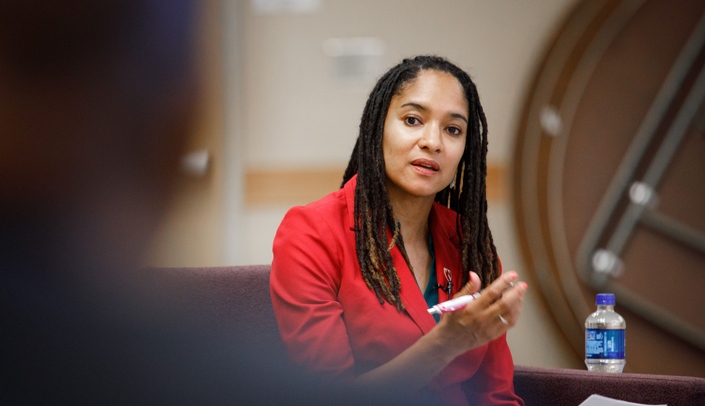To create positive and lasting change, one diversity advocate says we must acknowledge our biases and then move boldly toward them.
"Biases are what we make up about people before we actually know who they are," said Verna Myers, a Harvard-trained lawyer and founder of The Verna Myers Company.
During the Dec. 9 "Conversation for Inclusive Excellence," attendees viewed a video presentation in which Myers explains how biases can be dangerous and deadly, referencing the case of Michael Brown in Ferguson, Missouri. How do we know who people are, she asked, "when we’re told to ignore and be afraid of them?"
Myers, who also serves as vice president of inclusion strategy at Netflix, said that to overcome biases individuals must walk boldly toward preconceived notions and the groups that make them uncomfortable. And, she said, if we want all individuals to thrive, including young black men in our society, it is critical that each of us:
- Get out of denial and recognize and acknowledge our biases. She challenged the audience to consider: Who are you afraid of and who do you implicitly feel connected to or run away from? She encouraged individuals to reset their automatic associations about groups of people by "seeing" their possibilities and contributions. "Doing so can help disassociate the associations that automatically happens in our brain," she said.
- Expand our social and professional circles and build relationships that enable us to wholistically see the person and not the stereotype. Myers asked: "How many authentic relations do you have with young black people or with any other major difference from who you are?" Building such relationships, she said, is how we create communities where everyone can thrive.
- Have the courage to say something when you see or hear biases, stereotypes and prejudices. People perpetuate biases when others remain silent, she said.
Watch Myers’ TEDxBeaconStreet presentation online.
Sheritta Strong, MD, assistant vice chancellor of inclusion, challenged attendees to seek growth in spaces of discomfort. Doing so, she said, enables each of us to become the best versions of ourselves and connects with the med center’s iTEACH value of excellence..

Amazing TED talk! Thank you for sharing. Provided some very practical strategies to confront our implicit biases head on.
Great talk!